Paris 2024 Olympic soccer: What countries are competing and will VAR be used?
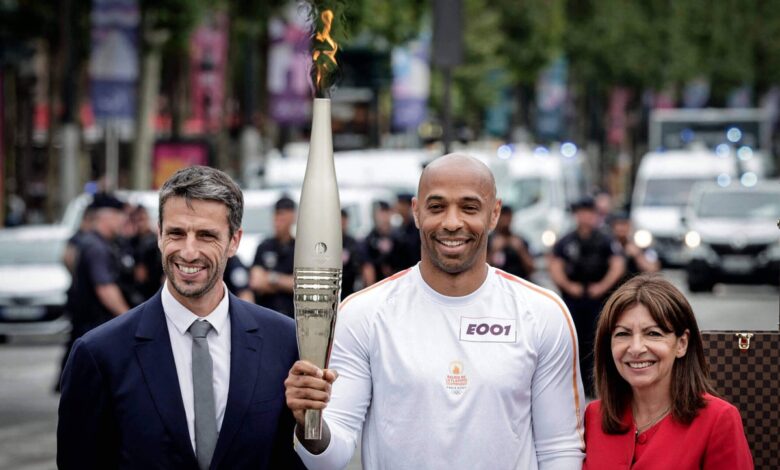
The 2024 Paris Olympics commence this week, bringing with it more international soccer tournaments this summer following the European Championship and Copa America.
The men’s and women’s soccer competitions take place across seven venues in France and conclude with the gold medal matches at Paris Saint-Germain’s Parc des Princes.
Both tournaments feature a collection of household names and up-and-coming young talent, previous gold medalists and debutants.
Here, The Athletic runs through of all the key information ahead of the Games.
When does soccer at the Olympics start?
The 2024 Olympics officially start on Friday, July 26 and conclude on Sunday, August 11.
The Olympic soccer tournament begins before the opening ceremony due to the number of games that need to fit into the schedule. The men’s tournament commences on Wednesday, July 24 and the women’s kicks off a day later on Thursday, July 25.
The men’s group stage runs from July 24 to July 30, before the quarterfinals on August 1 and semifinals on August 5. The men’s bronze medal match takes place on August 8 before the gold medal match on August 9.
The women’s group stage runs from July 25 to July 31, with the quarterfinals scheduled for August 2 and semifinals on August 6. The bronze medal match takes place on August 9 and the 2024 Olympic soccer programme concludes with the women’s gold medal match on August 10.
Which countries are competing in men’s soccer at the Olympics?
Argentina, back-to-back gold medalists in 2004 and 2008, are among the 16 teams competing in the men’s tournament. Argentina has named 2022 World Cup winners Julian Alvarez, Nicolas Otamendi, Geronimo Rulli and Thiago Almada in its squad, with Alvarez, Otamendi and Rulli also all part of Argentina’s Copa America winning squad earlier this summer.
Argentina faces Morocco in its opening group game. Paris Saint-Germain’s Achraf Hakimi has been included as an overage player in Morocco’s squad, having played an important role in his side’s historic run to the World Cup semifinals in 2022.
The USMNT is competing at the Olympics for the first time since 2008. The roster features new Chelsea signing Caleb Wiley, the 2023 U.S. Soccer Young Male Player of the Year Kevin Parades and the experienced Walker Zimmerman.
Spain, silver medalists at Tokyo, has included Euro 2024 winners Fermin Lopez and Alex Baena in its squad, alongside Barcelona’s teenage defender Pau Cubarsi, who was cut from the provisional roster for the tournament earlier this summer.
Lopez played once at Euro 2024 (Dan Mullan/Getty Images)
Hosts France has former Arsenal and Barcelona forward Thierry Henry (pictured in the top photo holding the Olympic torch) as its head coach, plus former Arsenal captain Alexandre Lacazette and new Bayern Munich signing Michael Olise in the squad.
Israel will be competing after FIFA delayed its decision on whether to suspend the nation from competing in international soccer until after the Games. The Palestinian Football Association (PFA) had proposed Israel be suspended amid the ongoing conflict in Gaza.
The Dominican Republic, Uzbekistan and Ukraine are all making their men’s soccer debuts at Paris 2024.
Olympic champions Brazil, however, will not be present in the men’s tournament for the first time since 2004 after failing to qualify.
Olympic men’s soccer groups
Group A: France, USA, Guinea, New Zealand
Group B: Argentina, Morocco, Ukraine, Iraq
Group C: Uzbekistan, Spain, Egypt, Dominican Republic
Group D: Japan, Paraguay, Mali, Israel
Which countries are competing in women’s soccer at the Olympics?
In the women’s tournament, Canada heads to France as defending gold medalists. Its roster features 13 players who won gold in Tokyo.
The USWNT is a record four-time gold medalist in women’s soccer and the Paris Olympics mark new head coach Emma Hayes’ first major tournament in charge. The roster features youngsters Trinity Rodman and Sophia Smith, plus the experienced Crystal Dunn and Lindsey Horan.
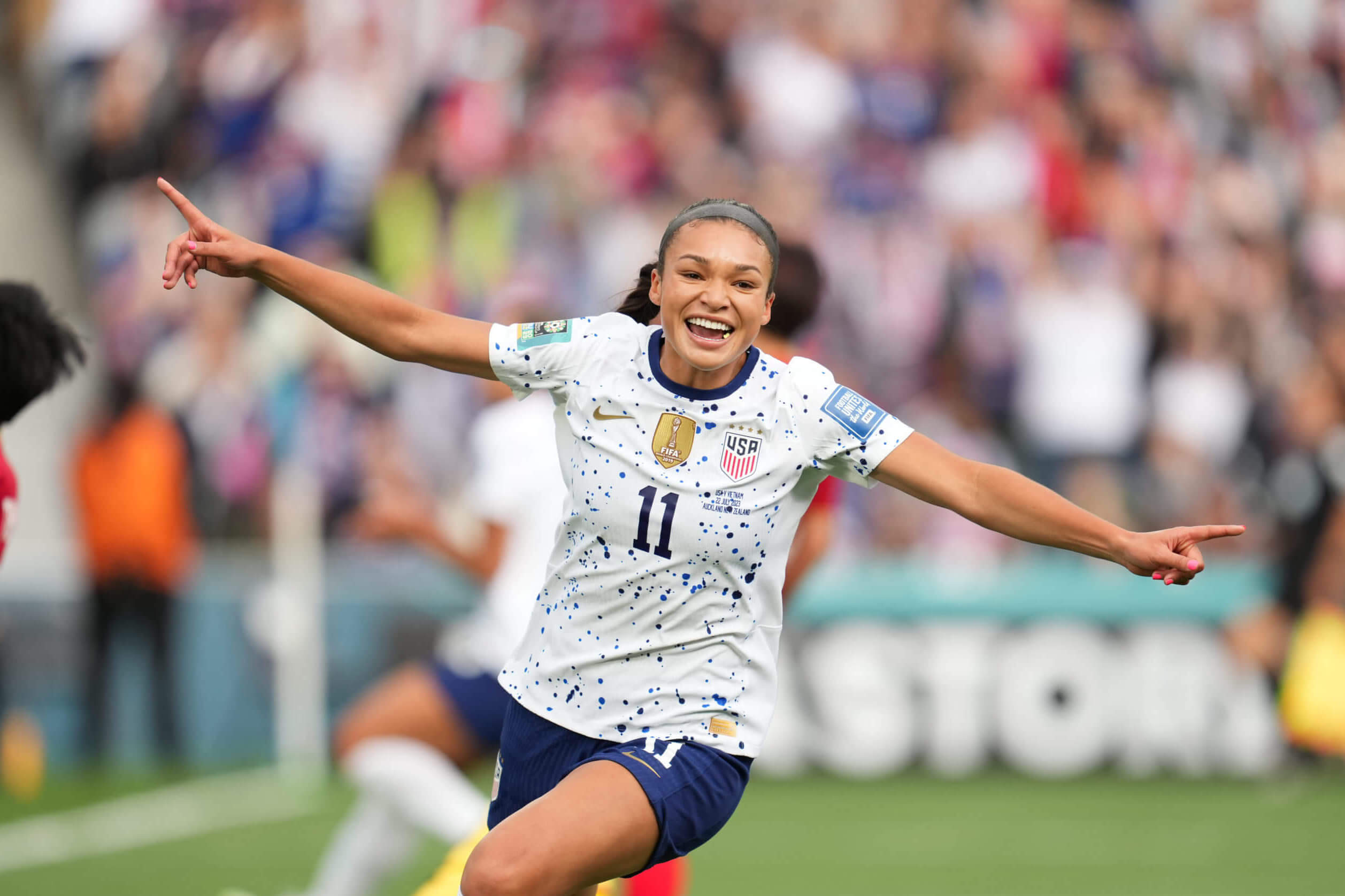
(Robin Alam/USSF/Getty Images)
Hayes’ side is in a group that also features 2016 gold medalists Germany, who return to the Olympics in Paris after failing to qualify for Tokyo, and an Australia side who lost to the U.S. in the bronze medal match three years earlier.
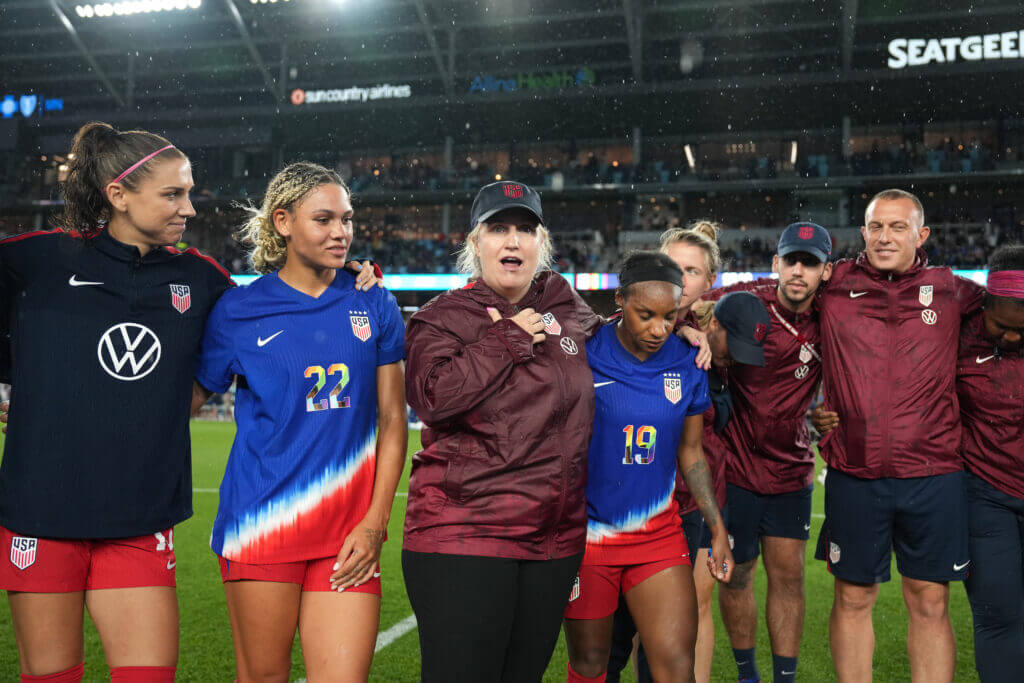
GO DEEPER
‘Finally ripping off the band-aid’: Breaking down USWNT’s Olympic roster and Alex Morgan’s snub
Zambia complete the USWNT’s group. Zambia’s Barbra Banda made history with her consecutive hat-tricks in the group stages at Tokyo 2020, and she has again been selected alongside the world’s most expensive women’s player Racheal Kundananji.
World Cup winners Spain will also be in Paris, making its Olympic women’s soccer debut. Ballon d’Or holder Aitana Bonmati, two-time Ballon d’Or winner Alexia Putellas and all-time top scorer Jenni Hermoso are all part of the squad. Barcelona midfielder Patri Guijarro has also returned following a period away in protest over the conditions within the national team.

GO DEEPER
Crisis, controversy and chaos – yet Spain’s national teams rule football
Brazil great Marta will compete at her sixth and final Olympics. The 38-year-old, Brazil’s all-time leading goal scorer, will retire from international football at the end of 2024.
Back-to-back silver medalists Sweden and Team GB both missed out on qualification.
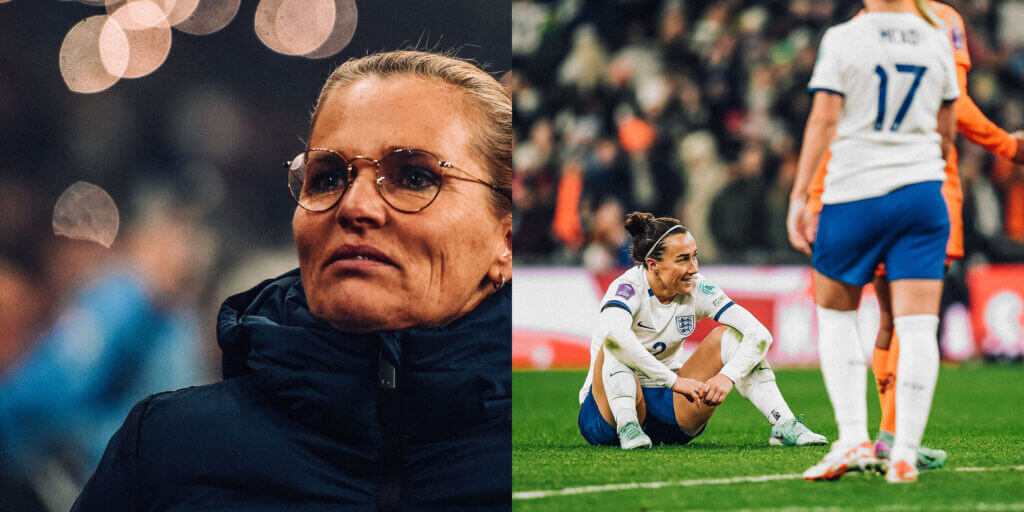
GO DEEPER
Team GB, the 2024 Olympics and why failing to qualify matters
Olympic women’s soccer groups
Group A: France, Colombia, Canada, New Zealand
Group B: USA, Zambia, Germany, Australia
Group C: Spain, Japan, Nigeria, Brazil
Why do the men’s Olympic teams have an age limit?
The women’s soccer tournament at the Olympics consists of fully open-age international sides, in keeping with other major international tournaments. As a result, the Olympics remains one of the most prestigious major tournaments in the women’s game.
However, teams participating in the men’s soccer tournament at the Olympics consist of under-23 sides, with up to three overage players permitted. The age limit was introduced in 1992 and the three overage players caveat was added four years later.
The age limit introduction came about as the Olympics transitioned from a strictly amateurs-only event to one that permitted professional athletes to compete. FIFA did not want the Olympics to rival the men’s World Cup as the primary major football tournament and therefore introduced various caveats to differentiate the Olympics from the men’s World Cup.
In the 1984 Olympics, European and South American players — the two continents considered football’s strongest as they had provided all 12 previous World Cup winners — could only select players who were yet to make a World Cup appearance. Similar restrictions were in place for the 1988 Olympics, before the age limit was introduced four years later.
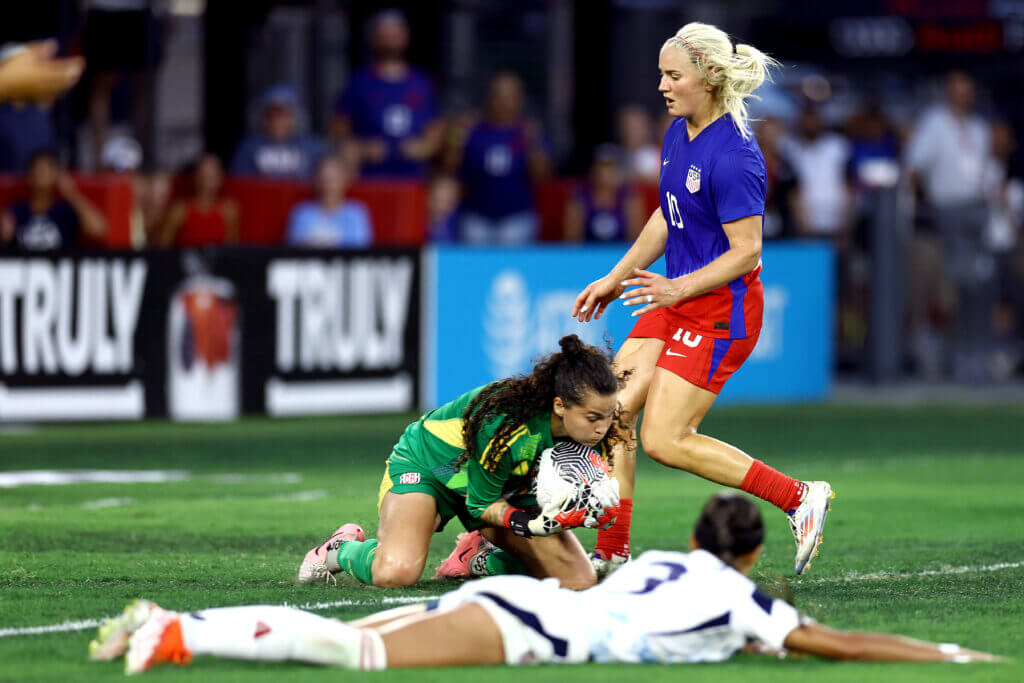
GO DEEPER
USWNT takeaways: Predicting Hayes’ preferred lineup and how the team solves scoring issues
What are the Olympic soccer extra-time rules?
Unlike at this summer’s Copa America, knockout round matches will go to extra-time if they finish as a draw after 90 minutes. This will consist of two periods of 15 minutes, followed by a penalty shootout if there is nothing to separate the two sides.
Group-stage matches can finish in a draw and do not go to extra-time.
Will VAR be used at the Olympics?
Both the men’s and women’s tournaments will use video assistant referees (VAR). VAR was used for the first time at the Olympics in Tokyo.
Semi-automated offside technology will also be used. That is where multiple tracking cameras are used to determine whether a player is in an offside position, and an inertial measurement unit is placed inside the ball to determine precisely when it is kicked, to provide fast and accurate offside decisions. It has been utilised in FIFA and UEFA club and international tournaments, and is set to be introduced in the Premier League next season.
Euro 2024 final referee Francois Letexier and the Premier League’s first female referee Rebecca Welch are among the officials heading to Paris.
When was women’s soccer added to the Olympics?
Women’s soccer was added to the Olympic programme at Atlanta 1996 — five years after the first official, FIFA-approved Women’s World Cup had taken place. The men’s soccer tournament has been part of the Olympic programme at every Games bar one (Los Angeles 1932) since 1900.
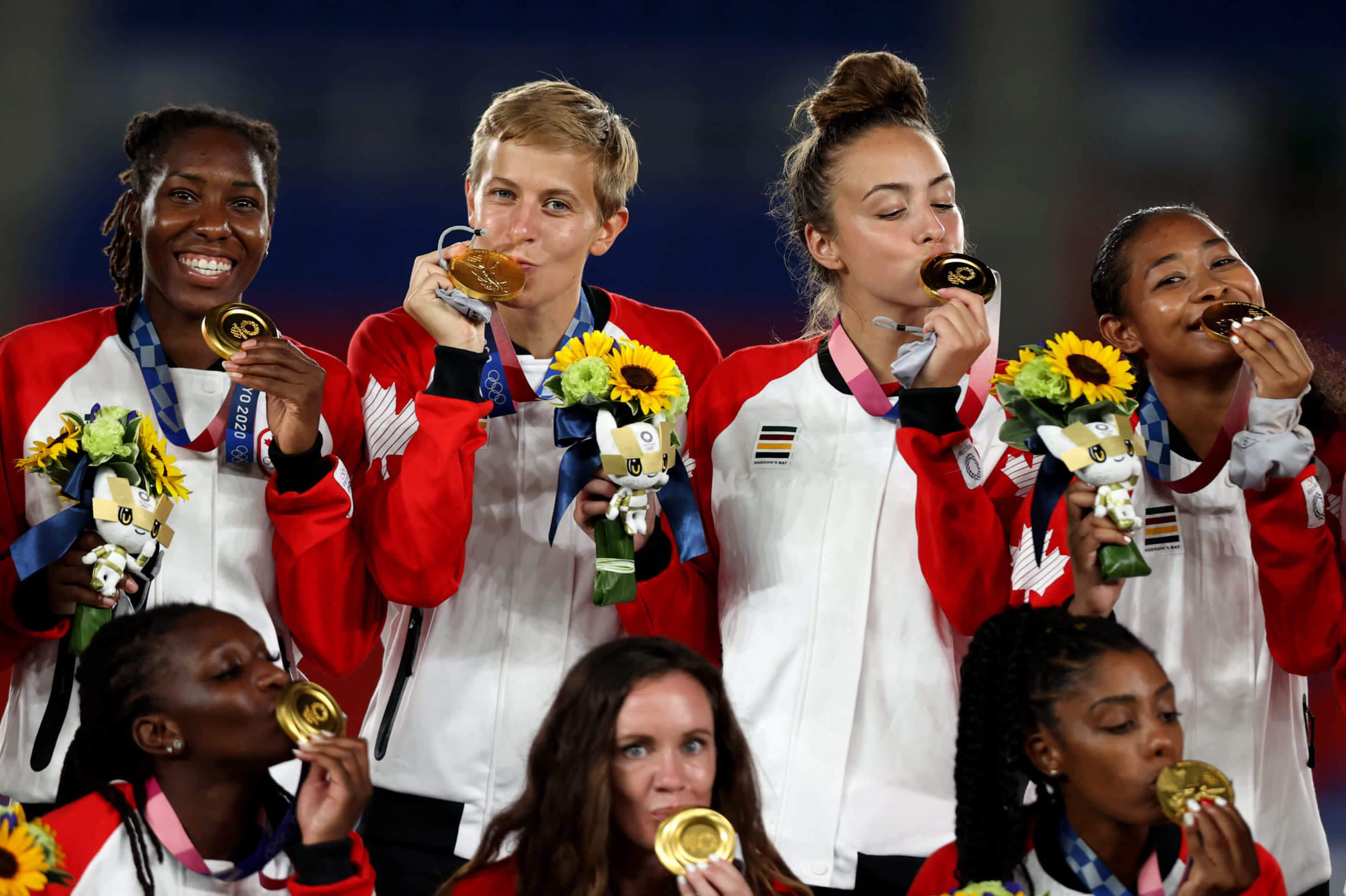
Canada is the reigning women’s soccer Olympic champions (Naomi Baker/Getty Images)
The sport was dropped at the 1932 Games due to a disagreement between FIFA and the International Olympic Committee (IOC) about the rules on amateurism. FIFA later accepted the rules and football returned to the Olympics in 1936. The dropping of football in 1932 also coincided with the first FIFA World Cup taking place in 1930.
The USWNT won gold in the 1996 final with victory over China in the final and won four of the first five Olympic women’s soccer tournaments.
(Top photo: Stephane De Sakutin/AFP via Getty Images)
Source link


